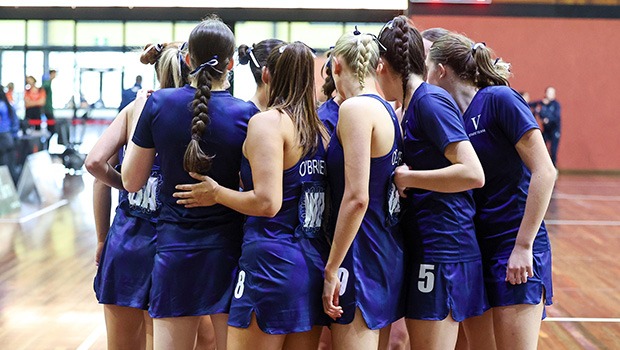
I hit a wall this week.
Not literally of course, although hitting an actual wall might have been easier to bounce back from.
After a fortnight that had included a full day of coaching on Sunday, a Tuesday night game, Wednesday night training, Thursday night training, Friday night selections, a Saturday all-day club event, Sunday morning training, Sunday afternoon tournament, Tuesday night game and two more training sessions on Wednesday and Thursday nights, on top of full-time work, the ol’ body and brain said enough is enough, and refused to haul themselves out of bed.
The phrase “if you want something done, ask a busy person” certainly rings true for many netball coaches who find themselves agreeing to take on an increasing number of roles or tasks because no matter how busy they get, they always seem to find a way to get things done.
400+ NETBALL DRILLS: REGISTER NOW TO ACCESS ALL OF OUR VIDEOS!
Often it’s our own fault, as we put up our hands for things despite already having more than enough on our plate.
But there’s only so much one coach can do before burnout hits.
My rule of thumb for players is that they should always be looking forward to going to their next session or game, and that if they’re not, chances are they’re a burnt out. And it’s the same for coaches – if we’re dreading hauling ourselves into the car and down to the courts, we’ve probably taken on too much.
Here are some tips to help you tackle burnout, or avoid it entirely.
BE SELECTIVE
Last weekend one of the very experienced coaches who features in a number of the videos on this site shared some wisdom and their own personal rule for limiting how much coaching they do.
To ensure they can give 100% to their coaching, their rule is that they will only take on one full-time (all-year) role and one part-time (or part-year) role every 12 months.
For them, this means an ongoing, year-round role at a state league club, as well as coaching a state team, which begins training in January and ends at nationals in April, giving them an eight-month break in which they’ll only be committed to one role.
It’s an approach that makes a lot of sense, and also gives them the flexibility to do an occasional extra day or two of coaching later in the year, without feeling overloaded.
ENLIST GREAT SUPPORT
How often do you find yourself running around, doing a million little jobs like organising equipment, emailing players or parents, chasing up fees or tracking down uniforms?
Could someone else be taking some of that load off your hands?
The most successful coaching year I ever had was one where our club administrator was so good at their job that virtually all we had to think about was turning up to training or games and coaching our teams.
Finding the right team manager or assistant coach can make an incredible difference to how much time and energy you’re forced to burn on things that have little to do with actually coaching your players, so put the time into recruiting someone who understands your role and how they can best help you.

PLAN AHEAD
No matter how careful you are about how much you take on, chances are that from time to time you’ll be swamped.
That’s why having things planning a few weeks (or even your whole season) ahead can lift a huge weight off your shoulders when you’re under the pump.
If you’re having a busy week, being able to look at your planner and see the bones of a session already laid out for you can relieve a huge amount of pressure and means you won’t have to find an hour (that you already don’t have) on the day in which to come up with your drills.
So map our your next 4-6 weeks ahead of time with the skills and activities you want to work on or build on at each session, and you’ll have a great framework to fall back on when time gets tight.
LEARN TO SAY NO
Did you know it’s actually OK to say no?!
As hard as it might be to feel like you’re disappointing someone, saying no to coaching or club requests when you’ve already taken on too much is something you should be prepared. to do.
CLUB SUBSCRIPTIONS: HELP YOUR COACHES DEVELOP THEIR COACHING!
If you’ve somehow become the go-to person for an ever-increasing number of people at the club, perhaps you could politely redirect them to someone else who can help them.
Or if you don’t have time right now, maybe you can schedule the latest request in for a later date when your calendar and brain are a little clearer.

SET CLUB AND TEAM GUIDELINES
How often do you find yourself receiving netball-related messages or correspondence late in the evening or at other odd hours?
Your down time is important, and if you’re constantly being dragged back into ‘netball land’ by your beeping phone or email, it can start to feel like you’re living at the club.
Creating club guidelines around when it’s OK for players, parents and club stakeholders to contact coaches is a good way of ensuring everyone gets to switch off.
Of course there will always be occasions when an emergency message or phone call is required, but if it’s something that can wait, having set times or windows when you’re able to be contacted can be enough to give you the break you need.
ASK FOR HELP
Don’t suffer in silence.
If 50 things are pulling you in different directions, chat to someone within your netball club who can help you.
Can your coaching coordinator help by redirecting a few tasks to the other coaches? Can someone on the committee step up to handle all of the admin tasks that are being thrown your way?
Maybe another coach can give you a chop-out and train your teams together for a session while you recharge your batteries. Even simply letting someone know you’re struggling can be a good first step, because if you’re still soldiering through regardless, chances are they’ll never realise.





